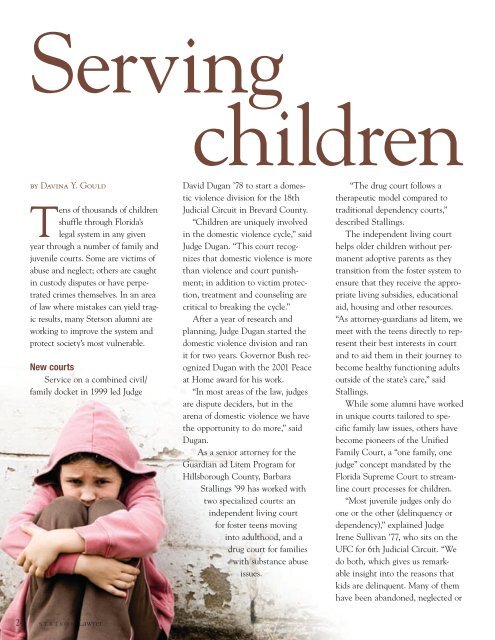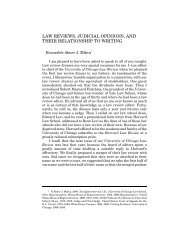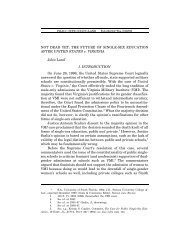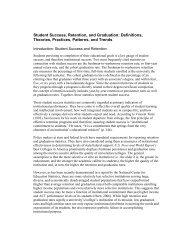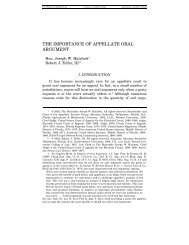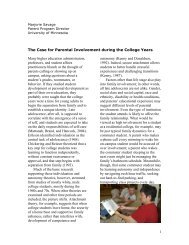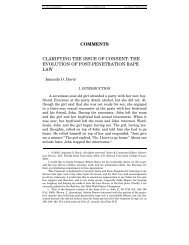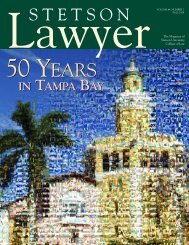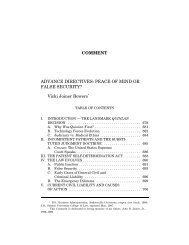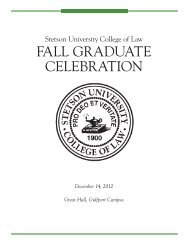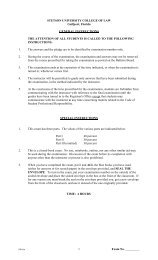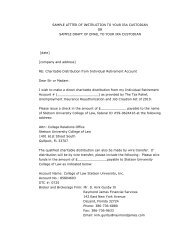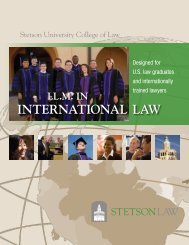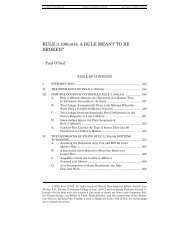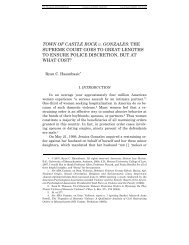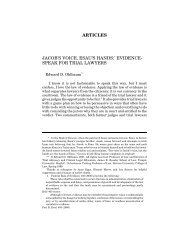Lawyer - Stetson University College of Law
Lawyer - Stetson University College of Law
Lawyer - Stetson University College of Law
Create successful ePaper yourself
Turn your PDF publications into a flip-book with our unique Google optimized e-Paper software.
Serving<br />
children<br />
by Davina Y. Gould<br />
Tens <strong>of</strong> thousands <strong>of</strong> children<br />
shuffle through Florida’s<br />
legal system in any given<br />
year through a number <strong>of</strong> family and<br />
juvenile courts. Some are victims <strong>of</strong><br />
abuse and neglect; others are caught<br />
in custody disputes or have perpetrated<br />
crimes themselves. In an area<br />
<strong>of</strong> law where mistakes can yield tragic<br />
results, many <strong>Stetson</strong> alumni are<br />
working to improve the system and<br />
protect society’s most vulnerable.<br />
New courts<br />
Service on a combined civil/<br />
family docket in 1999 led Judge<br />
David Dugan ’78 to start a domestic<br />
violence division for the 18th<br />
Judicial Circuit in Brevard County.<br />
“Children are uniquely involved<br />
in the domestic violence cycle,” said<br />
Judge Dugan. “This court recognizes<br />
that domestic violence is more<br />
than violence and court punishment;<br />
in addition to victim protection,<br />
treatment and counseling are<br />
critical to breaking the cycle.”<br />
After a year <strong>of</strong> research and<br />
planning, Judge Dugan started the<br />
domestic violence division and ran<br />
it for two years. Governor Bush recognized<br />
Dugan with the 2001 Peace<br />
at Home award for his work.<br />
“In most areas <strong>of</strong> the law, judges<br />
are dispute deciders, but in the<br />
arena <strong>of</strong> domestic violence we have<br />
the opportunity to do more,” said<br />
Dugan.<br />
As a senior attorney for the<br />
Guardian ad Litem Program for<br />
Hillsborough County, Barbara<br />
Stallings ’99 has worked with<br />
two specialized courts: an<br />
independent living court<br />
for foster teens moving<br />
into adulthood, and a<br />
drug court for families<br />
with substance abuse<br />
issues.<br />
“The drug court follows a<br />
therapeutic model compared to<br />
traditional dependency courts,”<br />
described Stallings.<br />
The independent living court<br />
helps older children without permanent<br />
adoptive parents as they<br />
transition from the foster system to<br />
ensure that they receive the appropriate<br />
living subsidies, educational<br />
aid, housing and other resources.<br />
“As attorney-guardians ad litem, we<br />
meet with the teens directly to represent<br />
their best interests in court<br />
and to aid them in their journey to<br />
become healthy functioning adults<br />
outside <strong>of</strong> the state’s care,” said<br />
Stallings.<br />
While some alumni have worked<br />
in unique courts tailored to specific<br />
family law issues, others have<br />
become pioneers <strong>of</strong> the Unified<br />
Family Court, a “one family, one<br />
judge” concept mandated by the<br />
Florida Supreme Court to streamline<br />
court processes for children.<br />
“Most juvenile judges only do<br />
one or the other (delinquency or<br />
dependency),” explained Judge<br />
Irene Sullivan ’77, who sits on the<br />
UFC for 6th Judicial Circuit. “We<br />
do both, which gives us remarkable<br />
insight into the reasons that<br />
kids are delinquent. Many <strong>of</strong> them<br />
have been abandoned, neglected or<br />
24 s t e t s o n <strong><strong>Law</strong>yer</strong>


